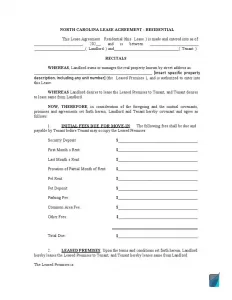North Carolina Rental Lease Agreement Forms
North Carolina, like any other state, has its very own legal norms and regulations when it comes to renting. This piece will help you navigate through them with ease. Despite the point that every situation is unique and most laws are constantly changing, there are some common grounds and peculiarities everybody needs to know.
A tenant-landlord relation in the state is regulated by the North Carolina General Statute (Chapter 42) and other Acts related to the issue.
North Carolina Laws and Lease Requirements
The lease agreement may be residential, agricultural, or commercial. We are going to review residential cases as the most common and demanded ones. Residential rent establishes certain obligations upon the tenant and the landlord; undermining them leads to consequences.
As determined by law, tenant-landlord rights and obligations are always mutually dependent. While the tenant has to pay the rent in time and maintain the premises in its initial condition, the landlord has got to do timely alterations and repairs as well as comply with the current property and housing codes of North Carolina.
A special section in Chapter 42 is dedicated to smoke and carbon monoxide alarms in the subject premises. Under local law, any enclosed subject must have at least one working carbon monoxide alarm approved and listed by the nationally recognized laboratory. If the premises have several floors, each level shall be equipped with at least one alarm.
Another remarkable local feature is that the North Carolina authorities support natural resources (electricity, water, natural gas) conservation. Therefore, they encourage landlords to include such conditions in a rental contract. Under this regulation, the landlord can charge the tenant extra for providing those services. However, the landlord has no right to cut the services off, even if the tenant fails to pay extra fees.
You can take a glimpse at the full list of norms and requirements regarding a specific rent subject or situation in an online version of the North Carolina General Statute.
North Carolina Lease Agreement: How to Write
You may use legal advice to draft a lease agreement in compliance with all the norms and regulations. But there is a much easier option—use our latest software to build the necessary agreement form and fill it in.
Each lease agreement should contain the following information:
- full names and personal data of parties to the agreement;
- subject property description, including physical address and utilities;
- tenancy term, rent amount, and payment due date;
- tenant’s rights and obligations;
- landlord’s rights and obligations;
- liability of sides, attorney’s fees (if applicable);
- information disclosures;
- termination procedures;
- space for signatures and contact information.
Various addendums might be included in a general lease agreement when the parties decide so. An addendum may touch upon such topics as pets, amenity, bed bugs, parking, student housing, and others.
Security Deposit Policy
The security deposit is a guarantee that the tenant will maintain the subject property in order. It is fully or partially refundable at the end of the tenancy. If there was intentional damage to the property, the landlord has every right to withhold the cost of the repair. The agreement contains a list of situations when the deposit may not be returned.
Landlord’s Right to Entry
The landlord shall be granted access to the subject premises in case of emergency, to make the necessary repairs and improvements, or to show the property to potential buyers and tenants. The landlord has to give the tenant reasonable notice before the inspection unless another is decided by a court order.
Fees and Liability
If either party breaches the agreement, the court can impose fines and fees. The General Code of North Carolina defines the fine amount for each agreement violation case, whether from the tenant’s or the landlord’s side. The landlords are not liable for any criminal actions of third parties towards the premises.
Termination Procedures
Either party can terminate the agreement by giving the other party a 30-day termination notice. There are special early termination conditions for military servants (in case of relocation or deployment), victims of domestic violence, assault, or stalking.
You may also use our software tools to build a termination notice form.
North Carolina Rental Lease Agreement Form Details
| Document Name | North Carolina Rental Lease Agreement Form |
| Other Names | NC Rental Lease, North Carolina Residential Lease Agreement |
| Relevant Laws | North Carolina General Statutes, Chapter 42 |
| Security Deposit Amount | Two months’ rent, or one and a half months’ rent (for tenancy-at-will) |
| Security Deposit Return | Thirty (30) days (if no deductions), and additional thirty (30) days if deductions |
| Avg. Time to Fill Out | 18 minutes |
| # of Fillable Fields | 119 |
| Available Formats | Adobe PDF |


Try out our document maker to personalize any template available on FormsPal to your preferences. Here’s a group of various other common North Carolina documents we provide.
Other Rental Lease Agreement Forms by State
